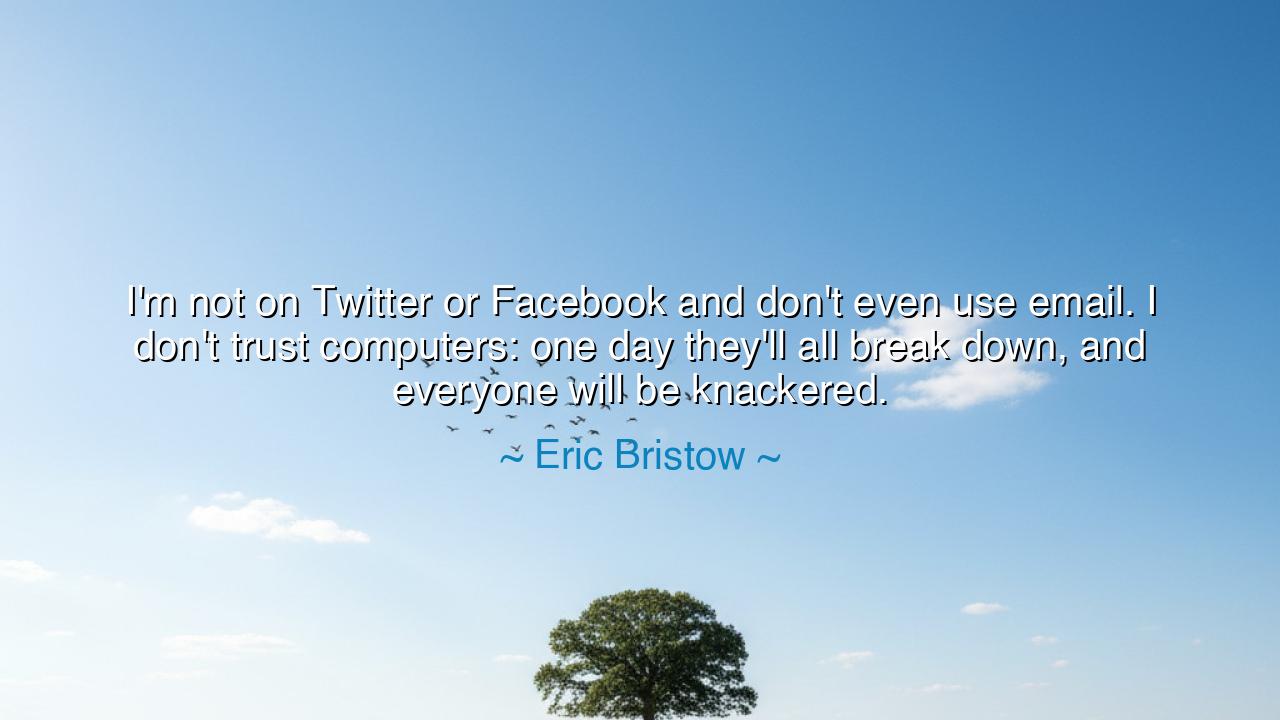
I'm not on Twitter or Facebook and don't even use email. I don't
I'm not on Twitter or Facebook and don't even use email. I don't trust computers: one day they'll all break down, and everyone will be knackered.






In an age when the hum of machines fills the air and men live half their lives behind glowing screens, Eric Bristow, the legendary darts champion, uttered words both simple and prophetic: “I’m not on Twitter or Facebook and don’t even use email. I don’t trust computers: one day they’ll all break down, and everyone will be knackered.” Though his tongue was plain and his tone defiant, beneath his jest lay a truth deep as any oracle’s — a warning to a world entranced by its own inventions. He spoke not as a philosopher cloaked in theory, but as a man of the old world, grounded in the flesh and rhythm of life before the reign of the machine. His words are both resistance and reminder — a call to remember what it means to be human in an age that risks forgetting.
To understand Bristow’s distrust of computers, one must understand the world he came from. Born in a time when communication was voice and ink, not pixels and passwords, he belonged to an era where conversation meant looking into another’s eyes, and friendship was measured not by followers but by faith. He rose to glory through skill, not through algorithms — his dart was guided not by code, but by the steady hand and the living mind. Thus, when he looked upon a generation bound to their devices, he saw not progress, but peril. He feared that when the machines falter, so too would the people — for they had forgotten how to think, remember, and connect without their glowing crutches. His warning was not against technology itself, but against dependence — that quiet enslavement which comes disguised as convenience.
In his statement, there echoes the ancient wisdom of every age that has faced its own idols. When men first built cities, some warned that they would forget the stars. When they forged coins, others feared they would forget the value of honesty. And now, as we build our kingdoms of information and connectivity, there are those — like Bristow — who warn that we may forget ourselves. His words remind us that every tool, no matter how wondrous, carries a shadow: for what empowers us can also weaken us, if we forget the strength that once came from our own hands and minds. To trust blindly in machines is to place the heart of our civilization in the care of something that does not feel, does not love, and cannot mourn what it destroys.
Consider the lesson of the Great Blackout of 2003, when much of North America was plunged into darkness. In a single hour, the hum of electricity — that unseen pulse of modern life — fell silent. Trains stopped, stores closed, and communications ceased. People, so accustomed to light at the flick of a switch, found themselves lost in the night. Yet, amid the confusion, something beautiful happened: neighbors who had never spoken gathered under the stars. Strangers shared food, laughter, and stories by candlelight. It was as though the world, briefly unplugged, remembered its soul. This is what Bristow meant: that when the systems fail — as all things built by man eventually do — we must not find ourselves helpless.
His distrust of computers and social media also speaks to a deeper yearning — a rebellion against the noise of the modern mind. For in our endless scrolling and posting, we risk mistaking motion for meaning, and connection for community. The ancients sought silence to find wisdom; today, silence terrifies us. Bristow’s refusal to enter that digital realm was not mere stubbornness; it was a stand for authenticity. He chose the tangible over the virtual, the spoken word over the typed, the real over the simulated. Like a warrior refusing an easy weapon, he preferred the strength that comes from being present in the flesh, not scattered in the web.
Yet his prophecy — that one day the computers will break down and the world will be "knackered" — should not be read only as doom. It is also an invitation: to prepare ourselves, not with fear, but with resilience. To remember the arts of thought, memory, and craft that no machine can replace. To learn again the joy of simplicity — of speaking face to face, of writing by hand, of knowing something not because it is searchable, but because it is lived. The wise prepare for the silence before it arrives; the foolish wait until the screen goes dark to remember how to see.
So, children of the digital dawn, take heed of Eric Bristow’s words. Let not your minds be slaves to convenience, nor your hearts grow cold in the glow of endless screens. Use technology, but do not worship it. Trust in innovation, but not at the expense of intuition. Learn to stand firm when the systems falter, to think when the networks fail, and to live when the machines sleep. For the truest power is not stored in circuits or code — it is stored in the unbreakable human spirit.
And that, perhaps, is the heart of Bristow’s teaching: that when the wires are cut and the lights go out, it is not the machine that will save us, but the memory of what it means to be alive — to feel the air, to look into another’s eyes, to speak, to trust, and to endure. In that moment, the ancient wisdom will return, and we will remember that we were never meant to be ruled by our own creations, but to master them with humility and heart.






AAdministratorAdministrator
Welcome, honored guests. Please leave a comment, we will respond soon